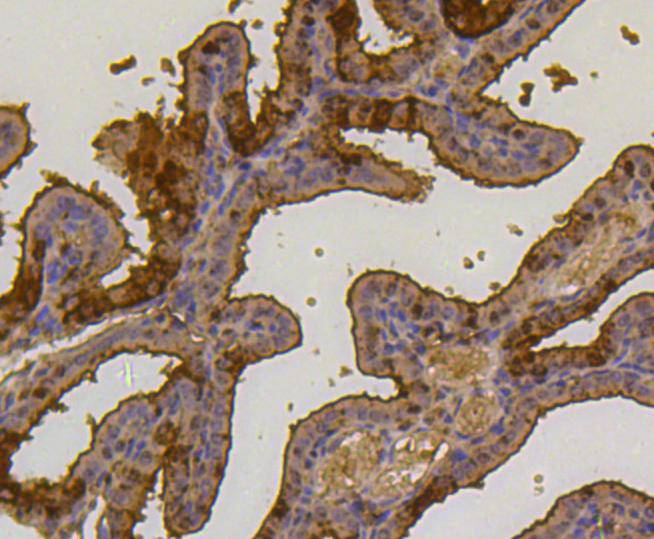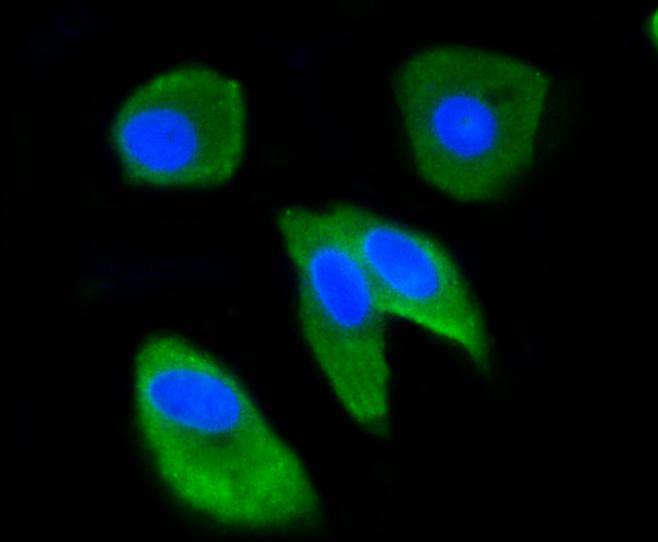Product Detail
Product NameUbiquitin Rabbit mAb
Clone No.SR04-20
Host SpeciesRecombinant Rabbit
Clonality Monoclonal
PurificationProA affinity purified
ApplicationsWB, ICC/IF, IHC, FC
Species ReactivityHu, Ms, Rt
Immunogen Descrecombinant protein
ConjugateUnconjugated
Other NamesFLJ25987 antibody MGC8385 antibody Polyubiquitin B antibody RPS 27A antibody RPS27A antibody UBA 52 antibody UBA 80 antibody UBA52 antibody UBA80 antibody UBB antibody UBB_HUMAN antibody UBC antibody UBCEP 1 antibody UBCEP 2 antibody UBCEP1 antibody UBCEP2 antibody Ubiquitin antibody Ubiquitin B antibody
Accession NoSwiss-Prot#:P0CG47
Uniprot
P0CG47
Gene ID
7314;
Calculated MW55 kDa
Formulation1*TBS (pH7.4), 1%BSA, 40%Glycerol. Preservative: 0.05% Sodium Azide.
StorageStore at -20˚C
Application Details
WB: 1:1,000-1:2,000
IHC: 1:200-1:500
ICC: 1:50-1:200
FC: 1:50-1:100
Western blot analysis of Ubiquitin on mouse heart lysates using anti-Ubiquitin antibody at 1/1,000 dilution.
Immunohistochemical analysis of paraffin-embedded mouse testis tissue using anti-Ubiquitin antibody. Counter stained with hematoxylin.
Immunohistochemical analysis of paraffin-embedded mouse brain tissue using anti-Ubiquitin antibody. Counter stained with hematoxylin.
Immunohistochemical analysis of paraffin-embedded mouse placenta tissue using anti-Ubiquitin antibody. Counter stained with hematoxylin.
ICC staining Ubiquitin in MCF-7 cells (green). The nuclear counter stain is DAPI (blue). Cells were fixed in paraformaldehyde, permeabilised with 0.25% Triton X100/PBS.
ICC staining Ubiquitin in SH-SY-5Y cells (green). The nuclear counter stain is DAPI (blue). Cells were fixed in paraformaldehyde, permeabilised with 0.25% Triton X100/PBS.
Flow cytometric analysis of HepG2 cells with Ubiquitin antibody at 1/50 dilution (blue) compared with an unlabelled control (cells without incubation with primary antibody; red). Alexa Fluor 488-conjugated goat anti rabbit IgG was used as the secondary antibody.
Ubiquitin is a conserved polypeptide unit that plays an important role in the ubiquitin-proteasome pathway. Ubiquitin exists either covalently attached to another protein, or free (unanchored). When covalently bound, it is conjugated to target proteins via an isopeptide bond either as a monomer (monoubiquitin), a polymer linked via different Lys residues of the ubiquitin (polyubiquitin chains) or a linear polymer linked via the initiator Met of the ubiquitin (linear polyubiquitin chains). Polyubiquitin chains, when attached to a target protein, have different functions depending on the Lys residue of the ubiquitin that is linked: Lys-6-linked may be involved in DNA repair; Lys-11-linked is involved in ERAD (endoplasmic reticulum-associated degradation) and in cell-cycle regulation; Lys-29-linked is involved in lysosomal degradation; Lys-33-linked is involved in kinase modification; Lys-48-linked is involved in protein degradation via the proteasome; Lys-63-linked is involved in endocytosis, DNA-damage responses as well as in signaling processes leading to activation of the transcription factor NF-kappa-B. This antibody reacts with ubiquitin, a polypeptide w/ Mr. of approx. 8.5kD. It reacts with physiologically occurring conjugates of ubiquitin and intracellular proteins. Specifically recognizes ubiquitinated cytoplasmic inclusion bodies.
If you have published an article using product 48860, please notify us so that we can cite your literature.
et al,Mycn ameliorates cardiac hypertrophy-induced heart failure in mice by mediating the USP2/JUP/Akt/β-catenin cascade. In BMC Cardiovasc Disord on 2024 Jan 31 by Weinian Gao, Na Guo,et al..PMID:38297207
, (2024),
PMID:
38297207









 Yes
Yes



